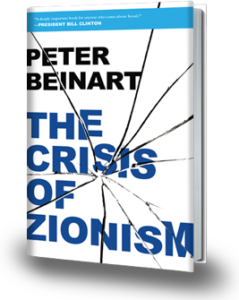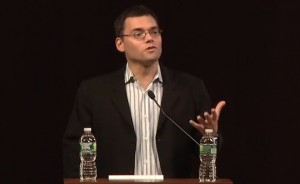The following was taken from Jspace.com. The article was written by Jspace Foreign Affairs Correspondent, Rob Lattin, who also blogs about Israeli and Middle Eastern foreign policy for Foreign Policy Blogs.

The Crisis of Zionism seriously questions Israel's future as a democratic country. (Photo: www.Peter-Beinart.com)
Daily Beast writer Peter Beinart recently released his newest book, The Crisis of Zionism, and it is making serious waves in the American Jewish and Israel activist communities.
Beinart’s basic assumption is that Israel’s democracy is currently eroding in large part due to its occupation of the West Bank. If peace negotiations with the Palestinians do not pick up, or the status quo is not changed in the relatively near future, he says, Israeli democracy may cease to exist all together. For Beinart, occupation and democracy are oxymoronic, because the policies in the West Bank, which is under Israeli control, are undemocratic. “Illiberal Zionism beyond the green line destroys the possibility of liberal Zionism inside it,” he writes.
Beinart’s Zionism and his love of Israel are synonymous with democracy. “As a Zionist, I believe that after two millennia of homelessness, the Jewish people deserve a state dedicated to their protection in their historic land … as a partisan of liberal democracy, I believe that to honor that history of suffering, a Jewish state must offer equal citizenship to all its inhabitants,” including the Palestinians, according to Beinart.
As long as settlers keep expanding and face minimal restrictions, Beinart states, they are threatening the existence of a Palestinian state, which in turn means they are threatening the future of Israeli democracy. “One day, maybe five years from now, maybe fifteen, maybe it has already happened, the green line will disappear: West Bank settlers will have grown so numerous and so entrenched within the Israeli government, rabbinate, and army that it will be impossible to remove enough of them to create a viable Palestinians state with a border near the Green line. When that happens, Zionism as a liberal democratic project will die.” Further, for Israel to stay a democracy without removing the settlers, it would have to grant equality to all of its inhabitants, including the 2.5 million Arab citizens of the West Bank and the 1.5 million in the Gaza Strip. This would lead to “Israel … commit[ing] suicide as a Jewish state,” Beinart writes.
“The Crisis of Zionism” places a great deal of blame on American Jewish leadership for not doing more to stand up to Israel’s self-destructive handling of the Palestinian situation, even accusing them directly of not caring about democracy. Beinart says that original Zionist-Jewish leadership in America—particularly Rabbi Stephen Wise and Louis Brandeis—were liberal minded, believed in universal social justice, and placed democracy in Israel as a priority.
“How did a Jewish community famed for its liberalism create a communal leadership so reluctant to defend liberal democracy in the Jewish state? The answer is simple: today’s American Jewish establishment was not born from American Jewish liberalism; it was born as a reaction against it … they do not champion democracy within Israel,” Beinart writes. Throughout the book he accuses AIPAC, Malcolm Hoenlein, Vice Chair of the Council of Presidents of Major Jewish Organization; Abraham Foxman, National Director of the Anti-Defamation League; and David Harris, Executive Director of the American Jewish Committee, of throwing away their liberal values and aggressively marginalizing any voice or organization that expresses any dissent towards Israeli policy.

Peter Beinart is a budding star for the left-wing pro-Israel constituency. (Photo: JewishJournal.com)
Beinart transitions to discuss how Israel and American Jewish leadership justify their policies and marginalize dissent through their purposeful, unlawful use of victimhood. In other words, Israel has the right to do anything it must for security, because its existence depends on it. This is flawed logic to Beinart. While he admits that threats to Israel and clear anti-Semitism do exist, he claims they are blown out of proportion and are not serious enough to warrant the picture that Israel and the American Jewish leadership portray. Beinart states:
“The final reason American Jewish leaders give for why American Jews should not publicly criticize Israeli policy is perhaps the most important because it goes to the heart of the victimhood narrative they have made central to American Zionism. They argue that because Israel’s very existence is being ‘delegitimzed’ around the world, American Jews must stand in its defense, not join the lynch mob. But this rests on a basic fallacy. There are, to be sure, left-wing activists and Islamist militants who oppose Israel’s existence as a Jewish state. But they are marginal compared to the much broader and more influential swath of people who seek to ‘delegitimize’ not Israel, but its occupation.”
Perhaps the most controversial aspect of the book is the very short conclusion. In it Beinart suggests that one way American Jews can reverse the erosion of Israeli democracy is by boycotting and divesting from products and companies originating in the West Bank. He is careful to point out that he is not advocating a boycott and divestment movement from Israel, just the settlements. This is the best way for American’s to show Israel that they do not agree with its policies, writes Beinart, and has been proven to be a successful tactic in the past.
Peter Beinart’s book has been met with some praise and a lot of criticism. Beyond the aforementioned themes, it is filled with thoughts about Jewish education in America, President Barack Obama’s ties to Zionism, Israeli Prime Minister Benjamin Netanyahu’s relationship to revisionist Zionism, and so much more. Regardless of one’s beliefs, The Crisis of Zionism offers a provocative outlook on the current environment of Zionism, and will certainly get readers thinking about their ideals and convictions.